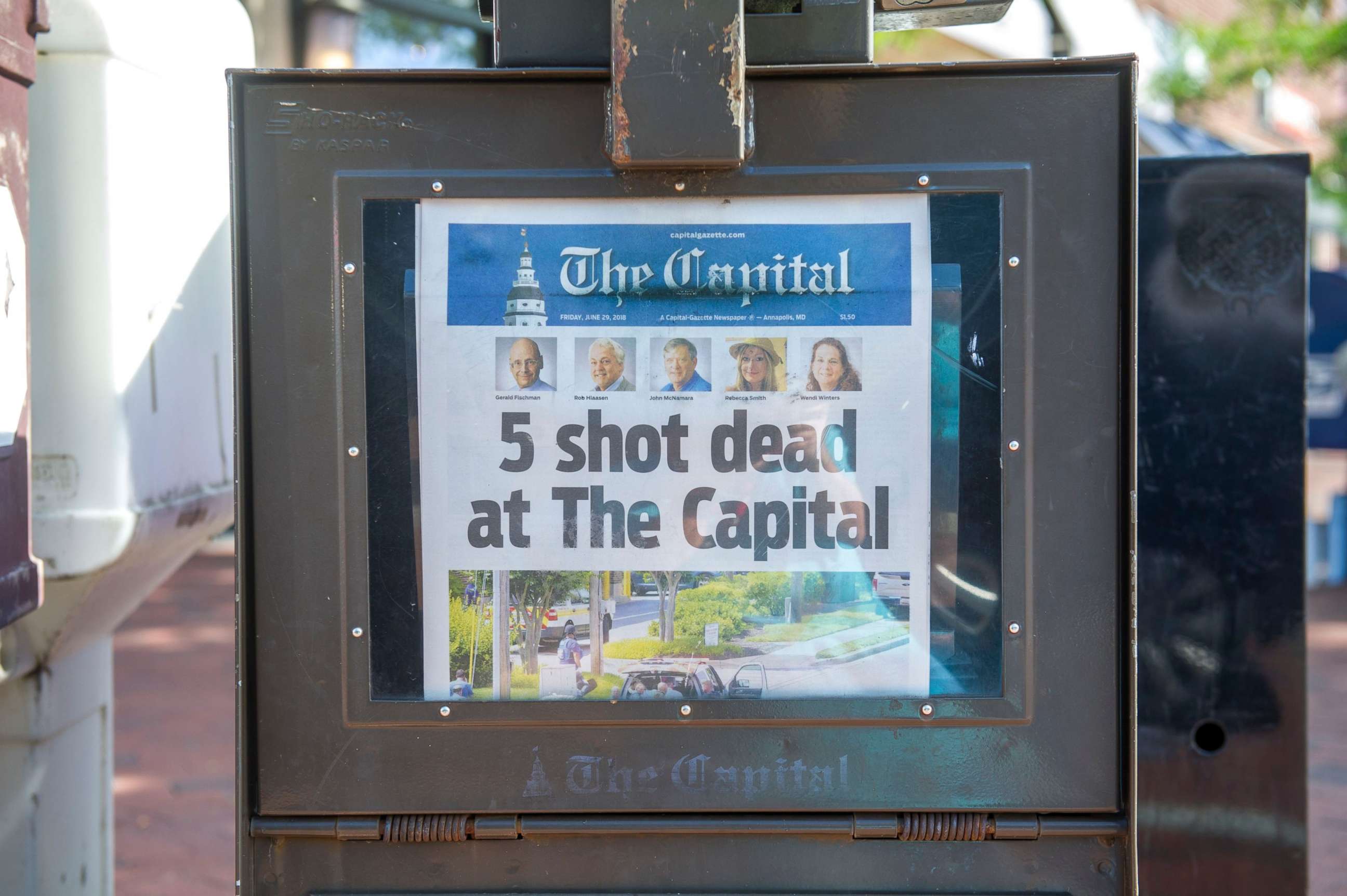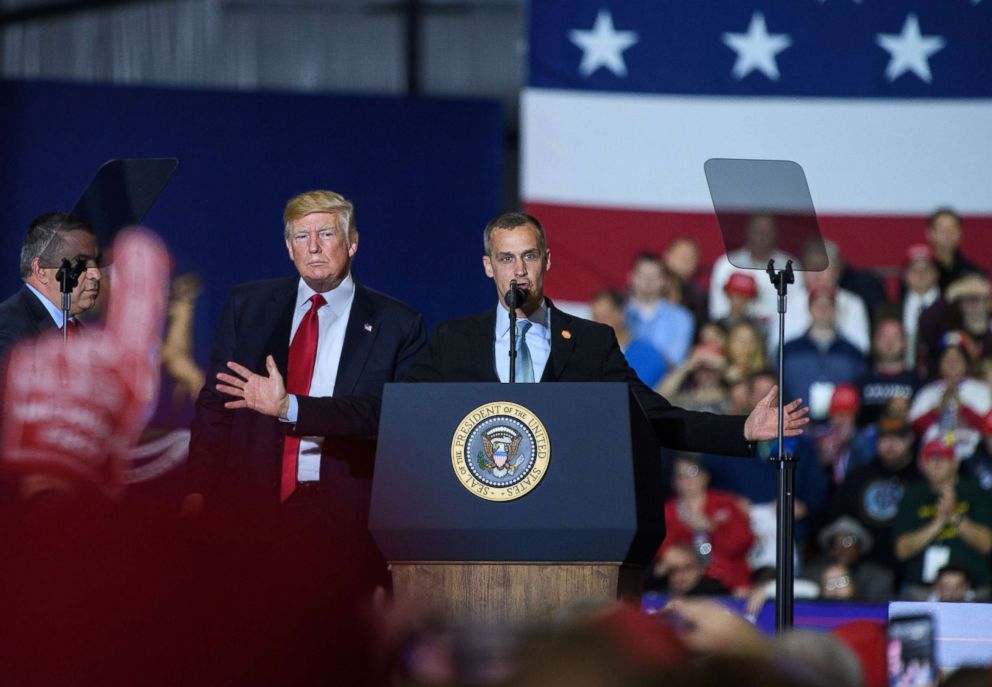'They do not feel alone anymore': Why critics of the media feel emboldened under Trump
Five people were killed at the Capital Gazette newspaper on Thursday.
Days before five people were shot in a Maryland newsroom, President Donald Trump took to Twitter once again to denounce "the enemy of the people Fake News."
The tweet was far from the first time Trump had attacked the press. Beyond his frequent refrain of "fake news" both on the campaign trail and in office, he has also called various news organizations and individual journalists liars, "sleazes," "third-rate" and "our country's biggest enemy."
On Thursday, a gunman with a long-standing grudge against Maryland newspaper the Capital Gazette, entered the paper's newsroom and opened fire, killing five. The shooter had previously filed -- and lost -- a defamation lawsuit against the paper and made threatening comments to its staff online. There is no indication that the attack was motivated by politics.
Jarrod Ramos, a 38-year-old resident of Laurel, Maryland, has been charged with five counts of first-degree murder in the incident. A judge ordered on Thursday that Ramos be held without bond because he has reasons to believe the man "is a danger to another person and community."

Following the shooting, attention pivoted to Trump's comments about the media and whether he had helped create a climate of hatred toward the press. But the reality is more complex, according to Joe Saltzman, a professor at the University of Southern California's Annenberg School for Communication and Journalism.
After the shooting, "everyone on social media blamed Trump when, in fact, this was just a disgruntled citizen who had lost a defamation suit and wanted revenge. It had little to do with the current climate, although many are making the case that he wouldn’t have taken that kind of extreme action without Trump’s emphasis on journalists being the real enemy. I think that is a hard case to prove," Saltzman told ABC News via email. "That said, it is never a good thing for the country, for the news media, for freedom of the press, when the chief executive of the land talks the way he does about the news media and "fake news.'"
On Thursday, Trump tweeted that he offered his "thoughts and prayers" to the victims, and on Friday he addressed the shooting before a tax event.
"Journalists, like all Americans, should be free from the fear of being violently attacked while doing their jobs," Trump said. "To the families of the victims, there were no words to express our sorrow for your loss. Horrible, horrible event. Horrible thing happened."
Seven journalists have been killed in the U.S. since 1992, according to the Committee to Protect Journalists, which released a statement denouncing the attack on the Gazette.
Joel Simon, executive director of the Committee to Protect Journalists, emphasized that there was no apparent connection between Ramos' act of violence and the current political climate at this time.
"Obviously, we have concerns that are completely separate and apart about the kind of rhetoric political leadership has used and the kind of climate that creates and the kind of atmosphere that creates for journalists in this country," Simon told ABC News.
But Trump's frequent attacks on the press have allowed others who feel similarly to become more vocal, Saltzman said.
"He has given permission to those who always distrusted the news media for a variety of reasons to go on the offense, becoming more vocal about the situation. People hate the news media for a variety of reasons –- they blame the news media for gay marriages, immigration, abortions, the economy, the homeless, their personal and financial problems and other one-issue complaints," Saltzman said.
"The hostile environment to the press has always existed, but in private conversations. Now those feelings are being voiced publicly because Trump has given his constituents the confidence to do so. They do not feel alone anymore when the most powerful government figure in the country agrees with them," he added.
Dan Shelley, the executive director of the Radio Television Digital News Association, issued a statement following the shooting.
"In the early hours following the Capital Gazette attack, there was much speculation – fear, on my part, I must admit – that the gunman had somehow been motivated by today’s vitriolic ideological and political environment. Many on social media jumped to that conclusion prematurely (not RTDNA), only, as we later learned, the suspect had a long-running personal vendetta against that specific newspaper," the statement read in part.
"Still, the events in Annapolis underscore the need for all journalists to heed an admonition I have been delivering to journalism groups across the country: Watch your backs, but don’t back down," the statement added.
Trump has long expressed his disdain for the media.
In December 2015, while speaking at a rally in Grand Rapids, Michigan, Trump told a crowd he was against killing journalists, a comment made in reference to Russian President Vladimir Putin.
"I would never kill them, but I do hate them. And some of them are such lying, disgusting people. It's true," Trump told the crowd.
Reporters at Trump events on the campaign trail and while he has been in office have been heckled by the president and his supporters, and Trump's former campaign manager, Corey Lewandowski, was accused of physically assaulting a reporter in 2016. During the campaign, Lewandowski was charged with battery for grabbing former Breitbart reporter Michelle Fields. The case was eventually dropped.

Trump has also taken to regularly calling the media the "enemy" this year.
"The FAKE NEWS media (failing @nytimes, @NBCNews, @ABC, @CBS, @CNN) is not my enemy, it is the enemy of the American People!" Trump tweeted in February.
Last year, Trump tweeted a video of his face superimposed on the body of wrestler who was body-slamming a person with the CNN logo on its face.
White House press secretary Sarah Sanders also frequently criticizes the media from her place at the podium during press briefings, Simon said.
"It's a kind of place where the First Amendment is acted out very visibly, where people see it. When journalists are out there shouting their questions and being aggressive, that sort of reaffirms this notion in people's minds that, hey the press is free, they hold people accountable. And when people stand up at the podium and insult journalists and mock them and the president does the same thing, that sends a very different message," Simon said.
Less visible but even more harmful to press freedom, Simon said, is the Trump administration's pursuit of leakers and the prosecution of journalists' sources. Trump's rhetoric about "fake news" has also been embraced by autocratic leaders around the world seeking to jail dissenting voices.
But by and large, it is community journalists that face the greatest dangers, Simon said.
"If you look around the world, it's local journalists reporting on their own communities who are very much most at risk. That's the global reality and we are now seeing that play out in the United States," Simon said. "It's very intimate. The people you're reporting on know you, and they read about what you write or say, and they and their neighbors hear it. So they take it really personally."
Officials said Thursday that Ramos will not cooperate with authorities, and his exact motive for the shooting remains unclear. But that personal dynamic seemed to be at play in the Annapolis shooting.
Tom Marquardt, a former editor and publisher of the Capital Gazette, told ABC News that Ramos had previously filed a defamation lawsuit in 2012 against the newspaper following a story about a harassment case in which Ramos was the defendant.
"He represented himself and took advantage of the legal system to keep the case alive for a long period of time during which he sued lawyers, judges, anybody who crossed his path and disagreed with him," Marquardt said. "Because of that grudge, innocent people died."
Marquardt, who worked at the newspaper for 35 years before retiring in 2014, said he once received a death threat from Ramos and alerted authorities. Police investigated but didn't have enough evidence to file any charges against Ramos, according to Marquardt.
"We had actually contacted the police to pursue one particular comment in which he wished I would be dead and the police looked into it," he added. "Beside that, there wasn't a strong enough case to take to court and our strategy really at that point was to lay low and to not infuriate him more than necessary because we just didn't want the argument to escalate into something worse."
For his part, Simon said he hoped Trump would build on the comments he made Friday and take this as an opportunity to "reset the rhetoric going forward."
"I hope that after a tragedy of this nature, the language is more tempered. I think going forward, if the president were to indulge in those kinds of insults, it would trouble me even more than what he has said in the past," he added.
ABC News' Morgan Winsor contributed to this report.




